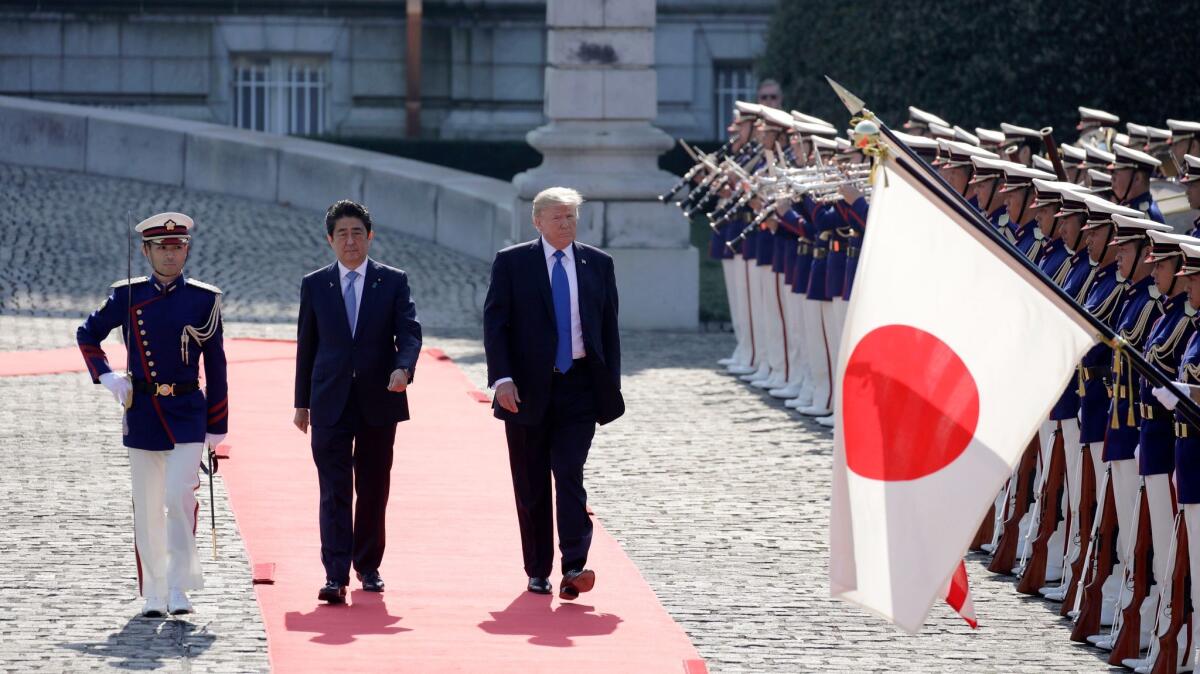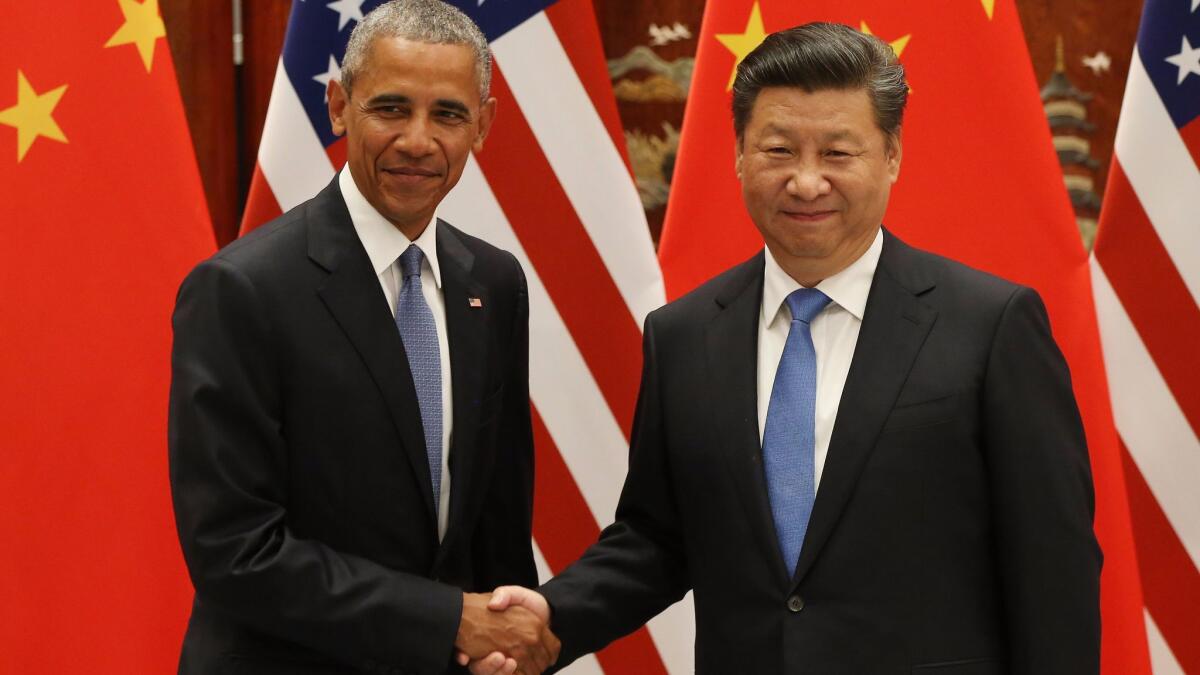Trump, diminished at home, is feted abroad, as Asian leaders employ flattery to stay on America’s good side

Reporting from BEIJING ‚ÄĒ President Obama made his last trip to Asia, in September 2016, from a position of relative strength. His approval ratings were reliably high, both at home and abroad. He deepened collaboration with China on climate change, doubled American aid to Laos, and lifted an arms embargo on Vietnam.
But in terms of decorum, the trip was a disaster. When Obama arrived in China, no staircase awaited Air Force One, causing a flurry of embarrassed confusion. He canceled a meeting with Philippine President Rodrigo Duterte after the strongman disparaged him profanely.

As President Trump begins a 12-day, five-country trip to Asia, his situation is essentially flipped. Trump arrived in Japan on Sunday as a diminished figure at home ‚ÄĒ legislative setbacks are piling up, his approval ratings are historically low, and his campaign is under investigation on suspicion of colluding with Russia. According to the Pew Research Center, the U.S. presidency‚Äôs favorability ratings abroad are at the lowest point since the George W. Bush era.
Yet Japan has feted Trump with ceremonial extravagance, and China and South Korea are expected to do the same, marking a fundamental shift in how foreign leaders are navigating their relationships with the U.S. presidency.
‚ÄúThere‚Äôs an under-the-surface story here,‚ÄĚ said Jonathan Pollack, an Asia specialist at the Brookings Institution, ‚Äúas all of these leaders reposition themselves and their countries for an era in which American power and the American presidency seem diminished in significant ways.‚ÄĚ
I don’t think we’ve ever been closer to Japan than we are right now.
— President Trump
Pollack said that a deep question lies beneath the polite ceremonies of Trump’s visit.
‚ÄúAre we seeing leaders that increasingly are trying to operate more, if not on their own, then at least mindful, first and foremost, of their own country‚Äôs interests?‚ÄĚ he said. ‚ÄúSo if we have America first, we may also have Japan first, China first, Korea first, etc., etc., etc.‚ÄĚ
Trump’s trip is the longest of any president since George H.W. Bush visited Asia in the early ’90s. Trump arrived in Japan on Sunday for a meeting with its prime minister, Shinzo Abe, and will continue on to South Korea, China, Vietnam and the Philippines. He’s expected to focus mainly on confronting North Korea’s nuclear threat, and also address U.S. trade imbalances in the region.
Trump has the lowest approval rating at this point in his presidency in the history of modern polling, according to a recent Washington Post-ABC News survey, which put it at 37%. His party is deeply divided ‚ÄĒ several prominent Republicans have openly rebuked him in recent months ‚ÄĒ and the Republican-controlled Congress has failed to introduce a new healthcare bill. Special counsel Robert S. Mueller III, who is investigating Russian interference in the 2016 campaign, issued his first indictments last week. (Trump has denied all allegations of wrongdoing.)
Meanwhile, Abe won a late-October snap election, giving his party a commanding majority in parliament. And Chinese President Xi Jinping, at a major Communist Party conclave last month, rose to become the country’s most powerful leader since Mao Tse-tung.
Yet in the eyes of many Asian leaders, Trump differs from his predecessors in key ways. His ‚ÄúAmerica first‚ÄĚ rhetoric ‚ÄĒ and unfiltered online behavior ‚ÄĒ have injected an element of unpredictability into once-stolid alliances. He‚Äôs enthusiastically dispensed with long-held presidential mores, such as championing human rights and democracy abroad. And his preferred mode of diplomacy is much more personal.
On Sunday, when Abe received Trump at the Kasumigaseki Country Club outside Tokyo, he assiduously appealed to the U.S. president‚Äôs personal tastes. Together, they signed white, gold-emblazoned hats that said ‚ÄúDonald & Shinzo Make Alliance Even Greater.‚ÄĚ They played nine holes of golf, accompanied by Japan‚Äôs top professional golfer, Hideki Matsuyama. They dined on hamburgers made with U.S. beef.
‚ÄúThe relationship is really extraordinary. We like each other and our countries like each other,‚ÄĚ Trump said later, over a teppanyaki dinner at an upscale Tokyo restaurant. ‚ÄúAnd I don‚Äôt think we‚Äôve ever been closer to Japan than we are right now.‚ÄĚ Abe tweeted that Trump was a ‚Äúmarvelous friend.‚ÄĚ
South Korea is planning a similarly elaborate itinerary, featuring a banquet with K-pop performances. Trump will meet President Moon Jae-in to discuss North Korea’s nuclear ambitions, and visit the U.S. military base Camp Humphreys.
On Wednesday, Trump will arrive in China to meet Xi ‚ÄĒ who will also probably roll out the red carpet, as the country seeks validation as a superpower on the same level as the U.S. (Trump praised Xi on his ‚Äúextraordinary elevation‚ÄĚ at the conclave last month, and described him as ‚Äúthe king of China.‚ÄĚ)
Chinese ambassador to the U.S., Cui Tiankai, said on Oct. 30 that Beijing would give Trump a ‚Äústate visit-plus,‚ÄĚ including a banquet and military honor guard. Authorities will close the Forbidden City on Wednesday for his visit.
‚ÄúDo the Chinese, when it comes to Trump, think they‚Äôve got his number ‚ÄĒ that they‚Äôve got him wrapped around their finger, and can manipulate him?‚ÄĚ asked Paul Haenle, director of the Carnegie-Tsinghua Center in Beijing and a former China affairs director on the National Security Council. ‚ÄúOr is this a function of them worrying about him being unpredictable and impulsive, and tough to deal with? My answer is ‚Äėyes‚Äô ‚ÄĒ it‚Äôs all of the above.‚ÄĚ
Beijing may ink several deals with U.S. businesses during the trip, Haenle said ‚ÄĒ Trump will be traveling with executives from 29 companies ‚ÄĒ yet the two sides are unlikely to resolve underlying issues such as structural barriers to entering the Chinese market, forced technology transfer, and widespread intellectual property violations. Nor is China likely to grant Trump any major concessions on North Korea, as its fears of regional instability still override any willingness to squeeze Pyongyang too hard.
‚ÄúHe‚Äôll get deals he can tweet out ‚ÄĒ the Chinese leadership will give him those,‚ÄĚ Haenle said. ‚ÄúBut those don‚Äôt address the fundamental issues.‚ÄĚ
Trump was defensive while speaking aboard Air Force One on his way to Japan, when reporters asked him about Xi’s successful run of consolidating power, compared with his own stature.
‚ÄúExcuse me, so am I,‚ÄĚ he said. ‚ÄúHighest stock market in history, lowest unemployment in 17 years, a military that‚Äôs rapidly rebuilding, ISIS is virtually defeated in the Middle East‚Ķ.‚ÄĚ
‚ÄúNow, with that being said, he represents China, I represent the United States,‚ÄĚ he continued, before launching into another recitation of U.S. stock market numbers. ‚ÄúBut we‚Äôre going in with tremendous strength.‚ÄĚ
China‚Äôs influence is growing stronger across the region ‚ÄĒ including in the Philippines, where Trump will meet the notoriously tough-talking Duterte.
Amy Searight, who served as deputy assistant secretary of Defense for South and Southeast Asia under Obama, noted polls in the Philippines show that favorable views of the United States are declining, while views of China are growing more positive ‚ÄĒ a trend that continues across several countries in Southeast Asia.
‚ÄúThis effect has been driven both by President Duterte‚Äôs outreach to Beijing and his distancing from Washington, but it‚Äôs also been driven by a lack of support for President Trump in the Philippines,‚ÄĚ said Searight, who is now a senior advisor and director of the Southeast Asia Program at the Center for Strategic and International Studies, a Washington think tank. ‚ÄúSo we‚Äôll have to watch to see if this visit and meeting will do much to turn that around.‚ÄĚ
Trump will meet Duterte for the first time at the Asia-Pacific Economic Cooperation summit in Da Nang, Vietnam, on Wednesday (they‚Äôre expected to meet again in Manila). Last year, after Obama criticized Duterte‚Äôs human rights-defying anti-drug campaign, the Philippine president said America treats the Philippines ‚Äúlike a dog,‚ÄĚ and announced a ‚Äúseparation‚ÄĚ from the U.S.
But Sunday, Duterte said he would meet with Trump ‚ÄĒ who has praised the drug war ‚ÄĒ ‚Äúin the most righteous way.‚ÄĚ No insults were forthcoming.
ALSO:
Taiwan finds a lot to like about its former colonizer, Japan
Asia is turning its back on democracy, and some say Trump isn’t helping
Kaiman reported from Beijing and Bierman from Washington.
Twitter: @JRKaiman, @noahbierman,
More to Read
Sign up for Essential California
The most important California stories and recommendations in your inbox every morning.
You may occasionally receive promotional content from the Los Angeles Times.











